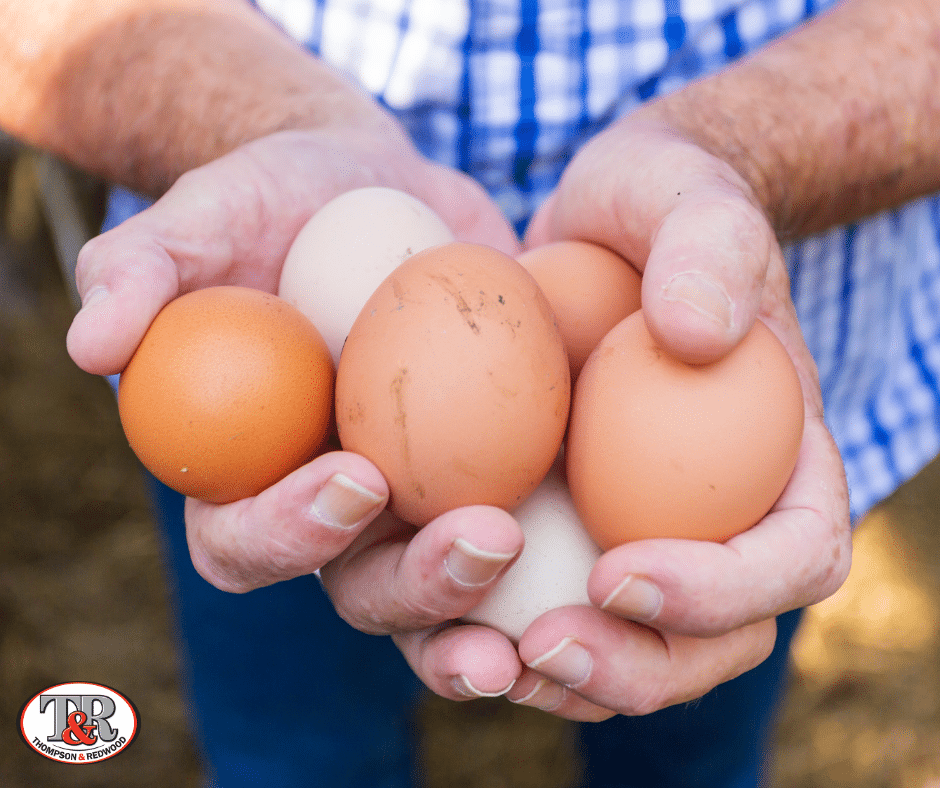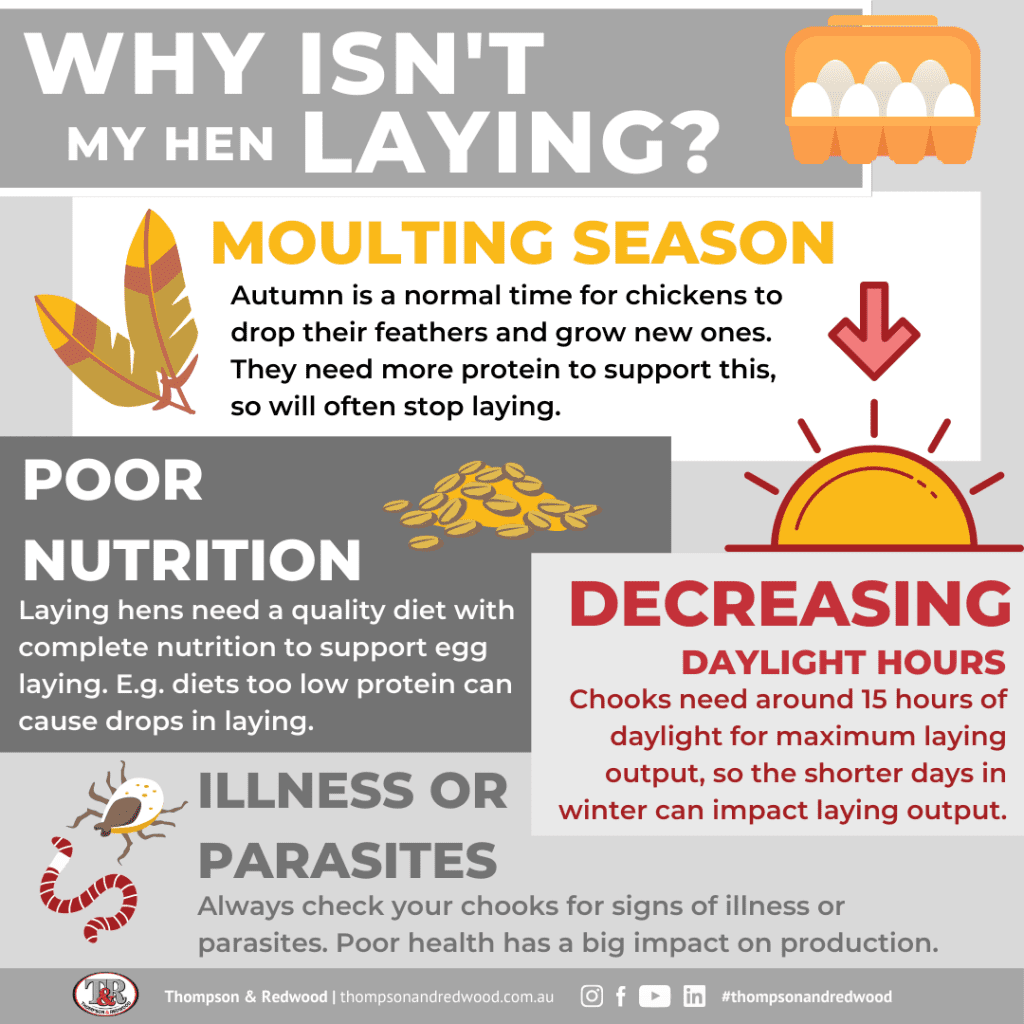
21 Apr Why Have My Chooks Stopped Laying?
Team Thompson & Redwood
Why have my chooks stopped laying?
a: They might be MOULTING
What is moulting?
Moulting usually occurs twice a year, in Autumn and in Spring. Moulting is triggered by a change in the number of daylight hours. Birds have a gland in their brain called the Pineal Gland, which is light sensitive, and works a bit like a biological clock and calendar. It regulates their growth, reproduction and hormones. So when the daylight hours start to drop, the Pineal Gland tells your chooks that WINTER IS COMING. It’s good timing, as they’ve usually been doing a lot of laying through spring and summer, and their bodies need a break, to prepare them for the next spring.
But why do they stop laying?
Feather production requires a large amount of protein, but so does egg production. Chickens don’t have the capacity to store protein, so get their daily protein requirements from their diet. Chooks will always prioritise their own health over laying, so will use this dietary protein for their feather growth, which takes it away from their egg production.
What can you do to help them through moulting?
- Provide plenty of protein for your chickens! Feathers are 80-85% protein so quality protein is essential for healthy feather production. Growing new feathers can use almost all their dietary protein. The minimum requirement for protein daily is 15%, so feeding a high protein feed (i.e. 17% protein) can help support the new feather growth during this time, and get them back to normal egg production sooner.
- Allow chickens access to a complete feed ad lib, and if they normally forage and get scraps, try to make sure they eat their complete feed first, so they’re protein intake isn’t diluted, and they are getting all the vitamins and minerals they need.
- Try to reduce stress as much as possible, and avoid adding new hens or changing anything too much.
- Your chickens, while they may look scruffy and decrease or stop laying should otherwise act normally during moulting season. If they seem unwell, seek veterinary advice.

Why have my chooks stopped laying?
A: The DAYLIGHT HOURS are decreasing
Chickens actually have an optimum number of daylight hours that they need in order to reach maximum egg laying, and this magic number is around 15 hours of daylight.
As we talked about with moulting, chickens have a light sensitive gland called the Pineal Gland, which regulates hormones. So when the days start to get shorter coming into winter, it triggers the pineal gland to decrease activity. This is a very natural process and comes from an old evolutionary feature. In the wild, this would prevent chickens from having chicks during the cold, harsh months, where the winter temperatures and lack of available food would make it difficult for chicks to survive.
What can you do?
Providing a high protein feed (greater than 15% protein content) can also help them to maintain a better level of egg production during winter.
Your chickens may need to increase their feed intake during the colder months to help them keep warm, so providing their feed ad lib can help them to adjust their intake as they need. Chickens are great self-regulators when eating, so will usually only eat what they need.
Why have my chooks stopped laying?
A: Their DIET is poor
A single laying hen 16 weeks and older will need an average of 100g of feed per day.
Of this 100g, the MINIMUM requirement of protein is 15%, and the MINIMUM requirement for Calcium is 3.5%.
What can you do?
Make sure you are providing, a quality, complete feed, ad lib. Chickens are great at self-regulating their eating, so providing feed ad lib allows them to eat what they need.
If you feed scraps or allow them to scavenge, try to make sure they are eating their complete feed first. Scraps are a great treat, but low in essential nutrients, so can fill them up without giving them much nutrition.
WHY HAVE MY CHOOKS STOPPED LAYING?
A: THEY MAY BE SICK OR HAVE PARASITES
Poor health has a big impact on egg production, and if you’re not careful, your chooks can get very sick, very quickly.
If you are worried about your chooks health, consult a veterinarian.

Need a quality feed for your flock?
We provide natural, fresh poultry feeds in Western Australia, and on the East Coast through PETstock stores.
Budget Laying Pellets
15% Protein, 4.1% Calcium
A cost-effective complete feed providing balanced nutrition to support health and laying in Backyard Chickens.
Available in 20kg bags in Western Australia, and 15kg bags in Queensland, New South Wales and Victoria through PETstock stores.
Premium LAYING PELLETS
17% PROTEIN, 4.1% Calcium
The best laying pellet money can buy! A premium, complete feed for laying hens, breeding flocks and show birds to promote superior health and egg production.
Available in 20kg bags in Western Australia only
LAYING Crumbles
17% PROTEIN, 4.1% CALCIUM
Our Premium Laying Pellets in a crumble form. Best laying feed money can buy! A premium, complete feed for laying hens, breeding flocks and show birds to promote superior health and egg production. In a crumbled form ideal for small breeds.
Available in 20kg bags in Western Australia, and 15kg bags in Queensland, New South Wales and Victoria through PETstock stores.
LAYING Mash
16% PROTEIN, 3.5% CALCIUM
A premium, complete feed with an assortment of cracked grains and seeds to promote natural selection and scratching. The high protein formula is ideal for laying hens for optimum egg production.
Available in 20kg bags in Western Australia only



Pingback:Feeding Chickens for Warmth in Winter - Thompson and Redwood
Posted at 06:04h, 04 June[…] Winter is a time when chooks will often decrease or stop laying due to the decreased daylight hours. It’s their way of giving their bodies a break to prepare for spring. It’s also an evolutionary feature, because in the wild chicks wouldn’t have a high survival rate in winter. Read more about why your chook might have stopped laying… […]